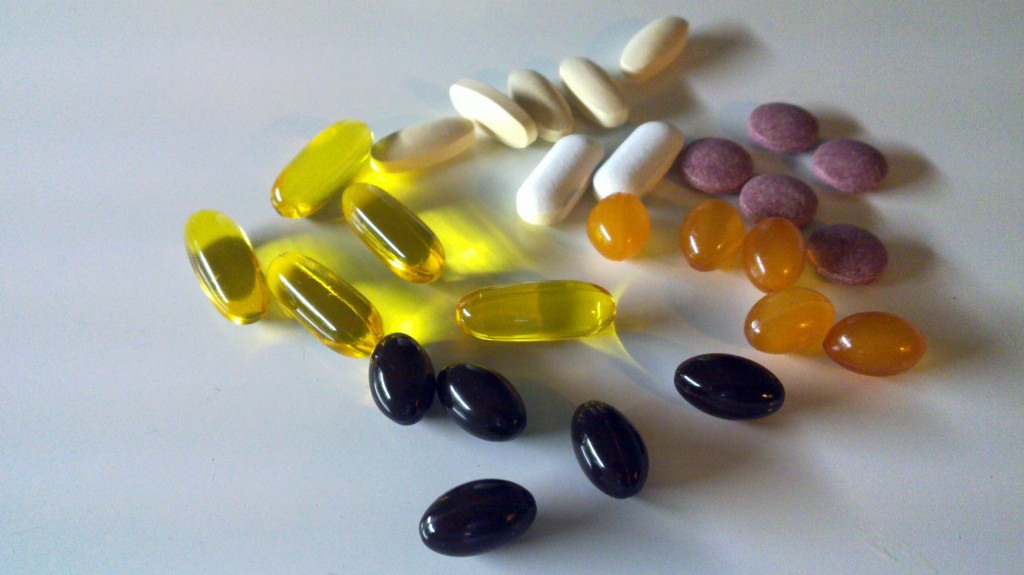
What is the Role of Supplements in a Healthy Diet?
Photo Credit: denAsuncioner, via Flickr Creative Commons
A few studies in recent years have raised questions about the validity of taking supplements. In the December, 2013 issue of Annals of Internal Medicine, an editorial reviewed the role of mineral and vitamin supplements for preventing the occurrence or progression of chronic disease. The research concluded that mineral and vitamin supplements to have no substantial health benefit for well-nourished healthy adults, suggesting that any effect, either beneficial or harmful, is small. It notes that some supplements such as high doses of beta-carotene, vitamin E and possibly vitamin A may be harmful and should not be used for chronic disease prevention.
Supplements are not intended to replace the nutrients found in food.
Ideally, we obtain all the nutrients, including vitamins, minerals and antioxidants that we need to optimally function and maintain good health from a well-balanced diet. It should include a variety of produce, whole grains, plant proteins, and, perhaps nonfat dairy. Not only do these nutrient-dense foods contain a wealth of vitamins, minerals, and fiber, but they are also rich in phytochemicals, which promote health and protect from chronic diseases such as heart disease, cancer and diabetes. However, a common question arises as to whether all nutritional needs can be adequately met from a plant-based diet.
First, let’s understand a little about the purpose of vitamins and minerals.
Why Vitamins?
There are 13 essential vitamins, including vitamins A, C, D, E, K and eight B-vitamins, that are important for good health. Vitamins are crucial for many of our metabolic processes such as releasing energy from nutrients and building and maintaining bones, teeth, skin, blood and many other vital body tissues.
Why Minerals?
Minerals are essential for optimal nutrition and good heath. Most minerals are only required in small amounts and can be easily obtained from a plant-based diet.
Minerals perform many roles in your body from building strong bones to transmitting nerve impulses. For example, calcium and phosphorus help build bones, and iron is an essential component of red blood cells called hemoglobin and in muscle cells called myoglobin. Hemoglobin transfers oxygen in the blood to the lungs and tissues, while myoglobin in muscles cells accepts, stores, transports and releases oxygen.
Minerals also work to regulate many body processes. Sodium and potassium are important to proper nervous system function. Chromium helps to maintain normal blood sugar levels. The trace mineral selenium has a role in DNA synthesis, hormone metabolism, and protecting against oxidative damage and infections. Zinc plays an important role in keeping us healthy by supporting our immune system. Here is an excellent science-based resource for dietary supplements.
By closely adhering to the nutrition guidelines for the Ornish Lifestyle Medicine, it is reasonable that you can get most of the nutrients you need. This means striving for at least the minimum of the recommended daily servings from each food group with a variety of choices within each food group such as eating from a “rainbow of produce colors.” Depending on your nutritional and calorie needs, choosing the upper limits from the different food groups such as whole grains and plant proteins, will be important for adequate intake.
The Case for Supplements
Despite some of the conflicting evidence supporting the benefits of supplements, there are cases where a multivitamin/mineral supplement is a good nutrition insurance policy to ensure adequate daily intake for basic nutritional needs. It is reasonable that some days our intake may fall short. For example, if you’re adhering to a low-fat, vegan diet, your vitamin B12 may be absent, and other vitamins and minerals such as vitamin D, calcium, iron and zinc can be low depending on your food choices. Nutrient absorption can also be impaired as we age and because of interactions with certain medications such as prolonged use of Metformin for diabetes. In these cases of deficiency or poor absorption, a basic multivitamin/mineral supplement may help fill in the nutritional gaps.
Vitamin B12
B12 is primarily found in animal sources. Nutritional yeast and fortified products such as breakfast cereals can supply vitamin B12 with high bioavailability for vegetarians. The RDA (Recommended Daily Allowance) for B12 is 2.4 micrograms. A person stores between 2 and 5 milligrams of vitamin B12 and only excretes a very small fraction of it each day. Nevertheless, over time, vitamin B12 deficiency can develop if stores are not replenished from diet or from supplements. It’s important to understand, however, that the body’s ability to absorb vitamin B12 from dietary supplements is largely limited. Only about 10 mcg of a 500 mcg oral supplement is actually absorbed in healthy people. According to the National Institutes of Health, when a person relies on dietary supplementation for B12, it’s helpful to strive for about 25-100 mcgs to maximize potential absorbed.
Calcium, Vitamin D, Iron and Zinc
Calcium, vitamin D, iron , and zinc can be limited on a vegan diet. But they can be obtained with awareness and inclusion of daily vegan-rich food sources.
It’s important to pay attention to whether you are getting enough of these vital nutrients every day. Iron deficiency is considered the most common nutritional deficiency, and it is often suggested that vegetarians are at increased risk because of the type of iron in plant foods. Plant food contain nonheme iron while animal foods contain about 40% heme iron, which is better absorbed. However, surveys have shown that vegetarians are no more prone to iron deficiency than the general population. One advantage to plant-based iron sources are that they also contain vitamin C, which markedly increases iron absorption.
Here’s a helpful video on supplementation for vegetarians.
The Ornish Program and Supplements
The American Dietetic Association says that the best nutrition-based strategy for promoting optimal health and reducing the risk of chronic disease is to eat a wide variety of nutrient-rich foods. A good standard to follow is the Dietary Reference Intakes. Additional nutrients from supplements, they add, can help some people meet their nutrition needs.
The nutrition supplement recommendations for the Dr. Dean Ornish Program for Reversal Heart Disease include a daily multivitamin and mineral that provides 100% of RDA of most nutrients with vitamin B12 (at least 2.4 micrograms/day) without iron (unless a woman is of childbearing age or prescribed by your physician), a fish oil supplement, or flaxseed oil capsules or ground flaxseed for strict vegetarians.
Buyer Beware
Just last week, the New York Attorney General released a report that found that four out of five tested bottles of store-brand herbal supplements did not contain any of the herbs on the label. Instead, they contained wheat, rice, beans or even common houseplants. These fake pills included brands sold by major store chains such as GNC, Target, Walmart and Walgreens. The attorney general has demanded that these stores stop selling these mislabeled supplements immediately. A hard-hitting op-ed by Timothy Egan in The New York Times explains how this industry fraud has happened.
The Bottom Line
Supplements most likely will not prevent disease or improve cognitive functioning. Perhaps some supplements will prevent deficiencies and ensure that we’re getting all the compounds and nutrients needed to support your bodies and brain, especially as we age.
Supplements are not intended to replace the nutrients found in food. They are intended to provide nutrients that may otherwise not be consumed in sufficient quantities. As the editorial published in the Annals of Internal Medicine suggests, high doses of supplements can increase mortality, but high doses are not just supplementing a needed gap. They are exceeding the RDA and basic needs. The Ornish Spectrum and the Dr. Dean Ornish Program for Reversal Heart Disease does not recommend high doses or doses that exceed the RDA for vitamins and minerals.
In what cases, has taking supplements helped your health and diet?








